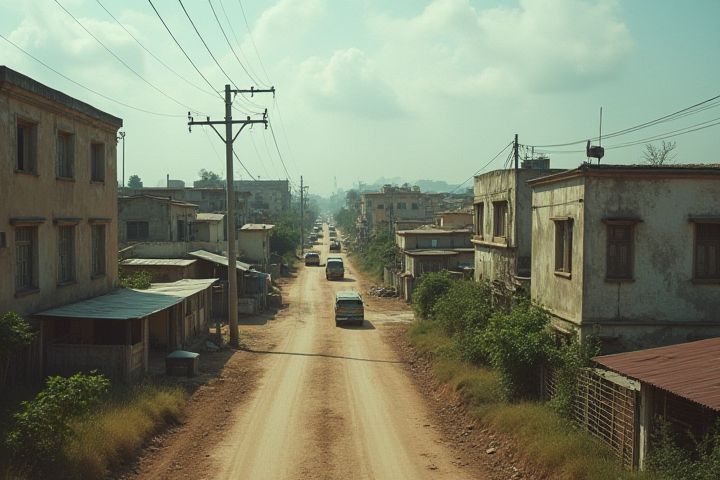
Urbanization in Nigeria significantly influences economic growth, shifting demographics, and cultural dynamics. Rapid migration to cities like Lagos and Abuja leads to increased job opportunities, enhancing industrial sectors and service industries. However, this influx also results in overcrowding, straining infrastructure and public services such as transportation, housing, and healthcare. Urban areas face challenges like increased crime rates and environmental degradation, significantly impacting the quality of life. Understanding these changes is crucial for developing sustainable urban policies that address the needs of Nigeria's growing urban population.
Infrastructure Strain
The rapid urbanization in Nigeria has led to significant strain on infrastructure, exacerbating issues such as traffic congestion, inadequate public transport systems, and overburdened roads. As cities expand, essential services including water supply, waste management, and electricity distribution struggle to keep pace with population demands. Urban areas like Lagos and Abuja experience frequent power outages and water shortages, impacting residential and commercial activities. You may notice how these challenges influence daily life, highlighting the urgent need for sustainable urban planning and investment in resilient infrastructure solutions.
Environmental Degradation
In Nigeria, rapid urbanization significantly contributes to environmental degradation, manifesting in deforestation, loss of biodiversity, and increased pollution. Coastal areas face severe erosion and degradation due to urban expansion and industrial discharge, threatening marine ecosystems. Air quality deteriorates in densely populated cities like Lagos, with vehicle emissions and industrial pollutants posing health risks to residents. As urban areas continue to grow, sustainable development practices are essential to mitigate these environmental impacts and protect Nigeria's natural resources.
Increased Unemployment
Urbanization in Nigeria has led to a significant rise in unemployment, as a swift migration from rural areas to cities creates an oversupply of labor. The influx of people seeking better opportunities outpaces job creation in urban environments, exacerbating economic challenges. Many young Nigerians face underemployment, engaging in informal sectors that offer low wages and limited job security. This escalating unemployment not only affects individual livelihoods but also hampers overall economic growth and stability in urban centers across the country.
Housing Shortages
Urbanization in Nigeria has intensified the housing crisis, with a rapidly growing population in cities such as Lagos and Abuja outpacing the available housing supply. Estimates suggest that Nigeria faces a housing deficit of approximately 20 million units, driven by rural-to-urban migration, increased urban poverty, and inadequate government policies. The lack of affordable housing options has led to the rise of informal settlements and slums, where many residents live without basic infrastructure, sanitation, or security. Addressing this shortage requires innovative solutions, including public-private partnerships, investment in low-cost housing development, and effective land-use planning to ensure sustainable urban growth.
Traffic Congestion
Nigeria's rapid urbanization has led to significant traffic congestion, particularly in metropolitan areas like Lagos, where the population exceeds 21 million. This congestion results from inadequate road infrastructure, a rising number of vehicles, and poor public transportation systems, causing daily delays that can extend for hours. The economic impact is substantial, as lost productivity due to traffic jams contributes to overall inefficiency and increased costs for businesses. To combat these challenges, smart traffic management solutions and investment in sustainable public transport options are essential for improving mobility and reducing congestion in urban centers.
Poverty Concentration
In Nigeria, rapid urbanization has intensified poverty concentration, particularly in megacities like Lagos and Kano. As people migrate from rural areas in search of better opportunities, inadequate infrastructure and housing contribute to the emergence of sprawling informal settlements, known as slums. These areas often lack basic services such as clean water, sanitation, and healthcare, exacerbating the challenges faced by low-income communities. Consequently, you may witness increased unemployment rates and social inequality, as urban economic growth does not equitably benefit all citizens.
Inadequate Sanitation
In Nigeria, rapid urbanization has led to significant challenges regarding inadequate sanitation, particularly in densely populated cities like Lagos and Kano. This lack of proper sanitation infrastructure results in contaminated water sources and increased disease transmission, impacting public health and exacerbating socioeconomic inequalities. Urban areas often see a surge in informal settlements, which are typically devoid of essential sanitation facilities, leading to unsanitary living conditions. You can observe the urgent need for government and community interventions aimed at improving waste management and sanitation services to mitigate these public health risks.
Health Challenges
Urbanization in Nigeria has significantly transformed the public health landscape, leading to increased health challenges. Rapid population growth in cities has overwhelmed healthcare infrastructure, resulting in inadequate access to essential medical services. The surge in urban living has also contributed to the proliferation of communicable diseases, as crowded environments facilitate the spread of infections like tuberculosis and malaria. Furthermore, lifestyle changes associated with urban life, including unhealthy diets and reduced physical activity, have escalated non-communicable diseases such as diabetes and hypertension, posing critical threats to your overall health.
Improved Economic Opportunities
Urbanization in Nigeria significantly enhances economic opportunities by attracting businesses and fostering innovation. As cities expand, they become hubs for trade and investment, offering diverse job prospects in sectors such as agriculture, manufacturing, and services. Increased urban populations drive demand for goods and services, which encourages local entrepreneurship and foreign direct investment. You can observe how urban centers like Lagos and Abuja are transforming into dynamic economic environments that contribute substantially to the nation's GDP.
Social Services Pressure
Rapid urbanization in Nigeria significantly strains social services, leading to inadequate healthcare, education, and housing. As cities swell with an influx of rural migrants seeking economic opportunities, existing infrastructure struggles to accommodate the rising population, often resulting in dilapidated facilities and insufficient resources. The limited access to essential services exacerbates social inequalities, impacting vulnerable groups disproportionately. Strengthening urban planning and investment in social services is crucial for addressing these challenges and improving the quality of life for urban residents.
